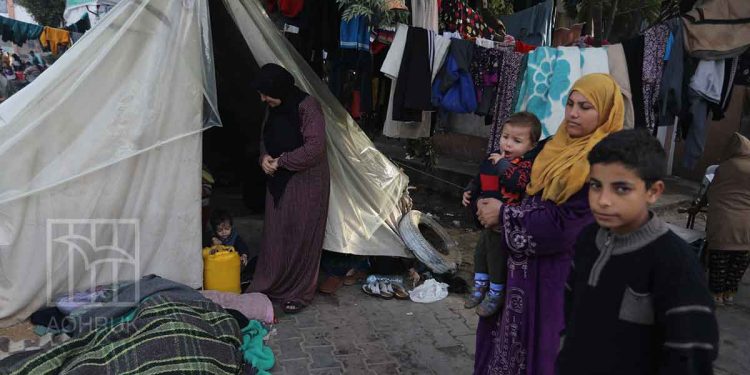The risk of the spread of infectious diseases in the Gaza Strip has increased due to the Israeli war on the Strip that continues for the 85th day in a row.
World Health Organization Chief Tedros Adhanom Ghebreyesus has said that he is “very concerned” about the growing threat of infectious diseases in the Gaza Strip.
“As people continue to be massively displaced across the south of Gaza, with some families forced to move multiple times and many sheltering in overcrowded health facilities, my WHO colleagues and I remain very concerned about the increasing threat of infectious diseases,” Tedros said on X.
He pointed out that “since mid-October until mid-December, people living in shelters have continued to fall sick.”
He stressed that “nearly 180,000 people suffer from upper respiratory infections, in addition to 136,400 cases of diarrhoea, half of whom are children under the age of 5 years, 55,400 people suffer from scabies, 5,330 with smallpox, and 42,700 with skin rashes – of whom 4,722 are infected.” With herpes – as well as 4683 cases of acute jaundice.”
The Ministry of Health in the Gaza Strip announced on Thursday that the health and humanitarian conditions in shelter centres have reached catastrophic levels as there are more than 1.9 million displaced people exposed to the risks of famine, extreme cold, and the spread of diseases and epidemics.
The Ministry noted that “50,000 pregnant women are in shelter centres without water, food, or health care, and about 180 women give birth every day in unsafe and inhumane conditions.
It added that 70 per cent of kidney failure patients are exposed to catastrophic health risks, as a result of bombing, displacement, and the difficulty of accessing dialysis services, especially in northern Gaza.
Since Oct. 7, the Israeli occupation army launched a bloody aggression on the Gaza Strip, causing a severe humanitarian and health catastrophe.
The Israeli aggression on the Gaza Strip constitutes a blatant violation of international humanitarian and human rights law as it exposes civilians’ lives to extreme danger, which requires immediate international intervention.






























